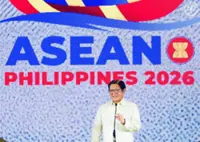KUALA LUMPUR: Malaysia and China should capitalise on the growing influencer economy to deepen bilateral trade and cultural ties, said an expert at the 2025 Kuala Lumpur Dialogue.
Huaqiao University Maritime Silk Road Research Institute president Huang Rihan said Malaysia’s e-commerce sector had shown strong growth but still holds untapped potential.
ALSO READ: Despite challenges, Malaysia pledges to solidify trust, communication with China

He said Malaysian products such as Musang King durian and bird’s nest have already captured the Chinese market’s interest, but there is significant room to expand this portfolio by introducing more products to Chinese consumers.
Huang suggested leveraging platforms like TikTok and Xiaohongshu, where influencers can craft engaging content that showcases Malaysia’s rich culture, scenic landscapes and high-quality products.
“Not only can this strategy boost trade but also foster a deeper connection between the people of Malaysia and China, paving the way for a more robust economic partnership,” he said at the first plenary session on “Regional Cooperation and Economic Revitalisation: Leading Asean’s Stability and Prosperity”.
ALSO READ: MOUs will deepen M’sia-China growth, say trade groups
The one-day forum was organised by the Institute of Strategic Analysis and Policy Research (Insap) and the Academy of Contemporary China and World Studies (ACCWS), with support from Fusion Institute, the Malaysia China Welfare Advisory Society and Bait Al-Almanah.
ACCWS International Cooperation director Zhang Jiuan moderated the session.
Also weighing in on current global trade dynamics, former director-general of China’s General Office of the State Council Research Office, Chen Wenling, criticised US trade policies, including tariffs and the ongoing trade war, calling them detrimental to global economic stability.
“It’s self-destructive for the United States,” Chen said, advocating instead for an approach rooted in Asian wisdom, characterised by inclusivity, care and mutual respect.
She called for joint efforts to uphold economic integration and safeguard free trade across the region.
Assoc Prof Dr Ngeow Chow Bing, director of the Universiti Malaya Institute of China Studies, echoed this concern.
He highlighted how US policy disruptions and the weaponisation of market access created uncertainties.
“It is important to maintain multilateral trade orders. Unity among Asean countries is also crucial to resist market weaponisation and maintain competitiveness,” he said.
ALSO READ: Synergy between two nations
Bank of China chief researcher Zong Liang acknowledged Malaysia’s strong progress, noting that China’s growth continues to offer complementary opportunities for Malaysia to advance further.
“Malaysia has grown leaps and bounds throughout the decades, with many achievements. I hope this growth will pave the way for greater and enhanced cooperation in the future,” he said.
Meanwhile, Nusantara Strategic Research Academy senior fellow Prof Dr Azmi Hassan addressed the negative perceptions that cloud Malaysia-China relations, driven by political narratives that portray China as a threat.
“We should be honest in discussions with our Chinese delegates. We also need efforts to improve perceptions and address issues like the South China Sea disputes,” he said.
Azmi also emphasised the importance of increasing Malaysian exports to China and open up economically to counter negative perceptions and foster better relations.
In the second plenary session on “Cultural Integration and Intellectual Exchange: Education and Arts as Bridges of Trust”, Communication University of China’s School of Cultural Development and Communications dean Prof Xiong Chengyu highlighted the rich Baba Nyonya culture in Malaysia and Singapore.
This culture, born from the intermarriage of Chinese settlers and local South-East Asian communities, offers a unique fusion of architecture, fashion and culinary traditions.
Xiong noted that China and Malaysia have recently collaborated on significant cultural projects, including the 2020 joint application for Unesco recognition of the “Wangkang Ceremony” as an Intangible Cultural Heritage.
The traditional Chinese Fujian ceremony involves a “royal barge” that travels through the streets, collecting wandering spirits before being symbolically burned in a cremation ritual.
Furthermore, he said they have sought recognition for the lion dance culture, demonstrating a commitment to preserving these traditions.
New Era University College Chinese Language and Literature Prof Onn Huann Jan highlighted the enduring impact of Prime Minister Datuk Seri Anwar Ibrahim’s 1996 book The Asian Renaissance, which promoted sustainable peace, innovation and mutual respect.
Onn said translating academic works between China and Malaysia can also enhance cultural understanding and exchange.





